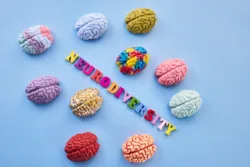The Influence of Social Media On Mental Health

Social media has changed the way people interact with each other on a daily basis. In most cases, it has expanded users’ circle of contacts with peers and improved the ability to communicate with others on a broad range of subjects. However, social media can also come with downsides, including unhealthy comparisons, decreased self-worth and even depression.
How social media affects your mental health
If you’ve ever taken a break from social media for even 24 hours, you might have noticed a difference in your productivity, thought patterns and habits. Maybe you noticed how, without the temptation of your phone nearby, you can finish a project faster; perhaps you’ve caught yourself reaching for your phone out of habit when it’s actually in the next room.
Checking our phones and scrolling social media as a form of distraction, procrastination or time-filler has, for some, become such a routine part of life that you notice the difference when you do take a break. These social media breaks are crucial to our well-being, as social media can have a dramatic, negative effect on your mental health.
According to one hospital, “Social media has a reinforcing nature. Using it activates the brain’s reward center by releasing dopamine, a “feel-good chemical” linked to pleasurable activities such as sex, food, and social interaction. The platforms are designed to be addictive and are associated with anxiety, depression, and even physical ailments.”
Because of the way social media keeps us coming back via its unpredictable nature (‘What will I see this time?’), it can slowly deteriorate our mental health without us being fully aware of it actually happening.
Social media’s negative effects
Whether we realize it or not, mindlessly scrolling social media yields big implications for our well-being.
Addiction of validation
Using social media supplies instant feedback in the form of comments, likes and follows. Research proves that these experiences on social media trigger the brain’s reward system in the same way as using drugs or alcohol, meaning the validation found through social media can become addictive.
However, the validation found online is fleeting and we are led to believe that we need to post more to feel validated — an unhealthy circle.
The threat of comparison
It’s widely known that most people only post the better moments of their lives. When we’re constantly looking at posts of others “living their best lives,” it is easy to slip into the trap of comparison — whether its a wedding, a haircut or a soup recipe that someone else posted. We then hold it up to our wedding, haircut or soup and feel bad that it’s not as perfect, or feel validated because it looks so much better.
All this does is brew a sense of bitterness in our spirits. If we’re constantly trying to make everything in our life look perfect so we can appear perfect online, we’re not living in reality, but from an unhealthy place of wanting to be outwardly superior to everyone else. And that gets exhausting.
The risk of cyberbullying
Because of the anonymity of social media, cyberbullying has increased significantly. Cyberbullying — including harassing, teasing and spreading rumors – is often found amongst younger users, but is not limited by age. Many individuals have been on the receiving end of cruel treatment online, which significantly, negatively affects one’s mental health.
The dystopian, algorithmic reality
Ever notice how your social media feed offers topics you’re interested in, the political side you take or the beliefs you hold? Have you clicked on one post and suddenly find your newsfeed drowning in posts on the same topic? The algorithms of social media are designed to specifically cater to your personal tastes. In some ways, this is beneficial, but in others, it can severely alter your perception of reality.
What you see online is specifically catered to you and your click history. This means that if you’re interested in one side of a political issue, you’re mostly going to see posts that support your ideas and may be less inclined to see the reason behind, and be compassionate towards, other ideas and beliefs that are, simply, different.
The lack of communication
The more time we spend online, the less time we spend interacting with the people in front of us. While it’s great to be able to keep in touch with long-distance friends and family, it’s important to remember the implications of online conversations. Deep, authentic and intentional dialogue in person not only creates strong bonds but encourages growth and self-discovery in ways online chatting simply cannot foster.
Limiting social media’s effects
Uncensored, unlimited time on social media can severely harm mental health, but certain strategies can help promote a healthy balance in your life:
- Set time limits for how long you can be on social media during the day
- Don’t let yourself engage in doomscrolling
- Take breaks, for as short as 24 hours to as long as one month
- Limit the number of social media sites you have
- Don’t be afraid of missing out if you choose to benefit your mental health by deleting social media entirely
If you find your mental health severely declining as a result of social media, do not be afraid to take the necessary steps of boosting your mental health by limiting or even deleting it from your life entirely.
Additional mental health guidance
Social media can have a strong negative impact on one’s mental health, but recovery is possible. By talking with a counselor, you can begin to reframe your perspectives and regain self-esteem. To get in touch with a counselor today, reach out to High Focus Centers PA by calling 610-644-6464.
In This Blog...
Related Posts

How Aromatherapy Supports Mental Health and Substance Use Recovery

Understanding Oppositional Defiant Disorder in Adolescents and Treatment Approaches at High Focus Centers Pennsylvania

Embracing Neurodiversity: How Specialized IOP Programs Support Teens in Radnor, PA

Feel Better Naturally: Boosting Brain Chemicals for Mental Wellness




